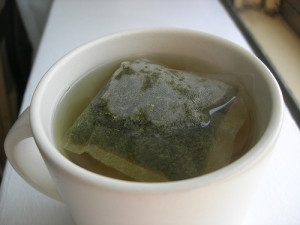There are basically 3 types of teas (black, oolong and green) and they are all derived from the same source – they are produced from the leaves of the Camellia Sinensis plant.
The difference only lies on how they are produced (the level of oxidation/fermentation). Black tea is fully fermented (thus the strong dark color), oolong is partly fermented, while green tea is unfermented.
It is important to note that the more oxidized or fermented the tea is, the higher the caffeine level and the lower the anti-oxidant content (the main source of its health benefits).

By: Dan McKay
This is why green tea is considered to be more potent than the other 2 types of teas.
Green tea contains 30-40% of anti-oxidants compared to 1-10% found in black tea.
Green tea properties include:
- Antioxidants (catechins)
- B vitamins,
- Folate
- Manganese
- Potassium,
- Magnesium
- Caffeine
Different Health Benefits of Green Tea
Green tea has been used for centuries by the traditional Chinese and Indians for several medicinal purposes.
Here are some of the green tea benefits that we can take advantage of in these modern days:
#1. Prevents Cancer – Research shows that green tea may help to prevent different types of cancer (breast cancer, prostate cancer, colorectal cancer etc.). The catechins in green tea, especially the Epigallocatechin Gallate (EGCG) inhibit the activities of free radicals, thus helping to prevent the growth of cancerous cells.
#2. Heart Health – It may also help to reduce the risk of cardiovascular disease by improving the factors that are responsible for heart disease – these factors include Cholesterol (HDL) and triglycerides.
The anti-oxidant effects of green tea help to prevent the HDL and triglyceride levels from going out of wacks, thereby reducing the risk of cardiovascular disease. It also helps to maintain normal blood pressure.
#3. Brain Health – Green tea contains caffeine, which functions as a stimulant. However, it doesn’t contain as much caffeine as coffee.
It blocks the Adenosine neuro transmitter and increases dopamine and norepinephrine, which leads to improved brain functions such as memory, concentration, alertness and enhanced mood.
Green tee also contains L-theanine, which has anti-anxiety effects and is helpful for depression.
#3. May Protect Brain In Old Age – Green tea may also protect your brain cells from degenerative brain diseases such Alzheimer’s and dementia.
#4. Dental Health – This unique tea may also help to improve your dental health. The catechins in green tea helps to prevent the growth of streptococcus mutans, which are responsible for causing dental cavity and tooth decay.
#5. Kills Bacteria and Virus, Prevents Infection – Green tea also contains anti-bacterial and anti-viral properties that may help to reduce your risks of infections.
#6. Type 2 Diabetes – Studies show that green tea may help to reduce blood sugar levels as well as insulin resistance, thus reducing your risks of developing type 2 diabetes.
#7. Weight Loss – The caffeine in green tea increases metabolic rate and acts as a fat burner, which can aid weight loss.
#8. Skin Care – Green tea is choked full of powerful anti-oxidants and anti-inflammatory properties that have anti-aging aging effects on the skin as well as help with skin conditions such as acne.
#9. Arthritis – The anti-inflammatory effects of green tea may also help to relieve pains and stiffness associated with arthritis.
How Much Green Tea to Take?
Experts suggest that you need to take about 5 cups of green tea a day to get the above mentioned health benefits.
There are also supplements that contain green tea if you do not want to go that route.
You should also note that green tea contains tannin, which inhibits the absorption of iron, so need to be cautious if you are pregnant or trying to conceive.
A lot of people take green tea because of its weight loss benefit, but you can see that this tea has a lot of wellness benefits you can take advantage of whether you are looking to lose weight or not.
Leave a Reply